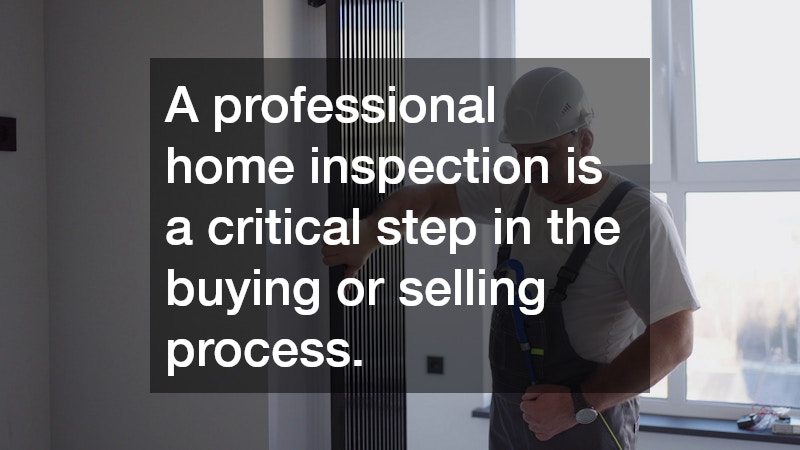
A professional home inspection is a vital step for anyone buying or selling a property. It provides an in-depth evaluation of a home’s condition, highlighting potential issues before they become costly problems. Understanding what to expect during the inspection can help you feel more confident and prepared. From structural components to plumbing systems and post-inspection reports, this guide will walk you through the essential aspects of a professional home inspection.
Key Areas a Home Inspector Examines
Home inspectors evaluate several critical areas of a property to assess its overall condition. One of the first areas they review is the structural integrity of the home.
This includes examining the foundation for cracks, checking walls and ceilings for signs of damage, and ensuring the roof is in good condition. Any structural issues are carefully documented, as these can affect both safety and property value. Electrical systems are also a major focus. Inspectors examine the electrical panel, outlets, switches, and wiring to ensure everything functions safely and efficiently. They look for outdated or faulty wiring, overloaded circuits, and potential fire hazards. Early detection of electrical issues can prevent accidents and save significant repair costs.
Plumbing systems are a central part of the inspection. Inspectors assess pipes, faucets, water heaters, drains, and any signs of leaks or corrosion. If problems are found, they may recommend professional plumbing services to address leaks, low water pressure, or aging pipes that need replacement. By evaluating plumbing systems, inspectors help homeowners prevent minor issues from becoming major repairs.
How Long You Can Expect an Inspection to Take
The duration of a home inspection varies depending on several factors. On average, a standard inspection takes two to four hours, though larger homes or properties with complex systems may require more time. Inspectors aim to conduct a thorough review, ensuring no critical detail is overlooked. Several elements influence how long an inspection takes. The size and age of the home, the number of systems being examined, and the overall condition of the property all play a role. Older homes or those with previous renovations may require extra attention to confirm all modifications meet safety standards.
After the inspection, the inspector prepares a detailed report. This process generally takes one to three days, depending on the inspector’s schedule and the complexity of the findings. The report provides a clear overview of any issues discovered, serving as a foundation for informed decisions.
What You’ll Find in a Home Inspection Report
A home inspection report summarizes the inspector’s findings and details the property’s condition. This typically includes structural components, electrical systems, HVAC units, roofing, and plumbing. Inspectors describe any deficiencies clearly, helping homeowners understand the scope of potential repairs. Visual documentation is an important part of the report. Photos highlight specific areas of concern, allowing buyers and sellers to see exactly where issues exist. This visual evidence supports recommendations and ensures transparency throughout the process.
Reports also include suggested actions and repairs. For example, if a plumbing issue is discovered, the inspector may recommend contacting licensed plumbing services to repair leaks, replace corroded pipes, or update outdated fixtures. Clear recommendations help homeowners prioritize maintenance and make informed decisions about the property.
Understanding the Costs of a Home Inspection
Home inspection costs vary depending on factors such as the location, size of the property, and the qualifications of the inspector. Specialized inspections for pests, mold, or sewer lines may also result in extra fees. On average, a standard home inspection ranges from $300 to $600 for a typical property. Larger homes or those with complex systems may cost more. While this may seem like a significant investment, a professional inspection can prevent much higher expenses later. Additional costs may arise if the report identifies issues requiring specialized services. Licensed plumbing services, for instance, may be necessary to fix leaks or update outdated pipes. Considering these potential costs ensures homeowners are prepared for necessary repairs and maintenance.
What Happens if a Home Has Major Issues
Technically, a home cannot “fail” an inspection. Inspectors provide an objective evaluation, not a pass/fail grade. However, serious problems can affect negotiations or influence a buyer’s decision. Common deal-breakers include structural damage, major plumbing leaks, unsafe electrical systems, or severe water damage. These issues often require immediate attention and can impact property value. If major problems are discovered, homeowners have options. Sellers may address repairs before listing, or buyers may negotiate repair credits. Professional plumbing services or other licensed contractors may be required to bring systems up to standard. Knowing post-inspection options allows both parties to make informed, confident decisions.
A professional home inspection is a critical step in the buying or selling process. Understanding what inspectors examine, how long the process takes, and what is included in the report allows homeowners to approach inspections with confidence. From structural components to plumbing systems that may need professional plumbing services, this knowledge helps buyers and sellers make informed decisions, avoid costly surprises, and maintain the long-term health of their property. With a thorough inspection, you can move forward knowing your home is safe, functional, and ready for its next chapter.






